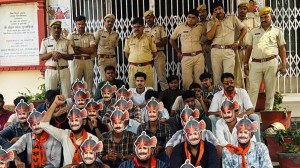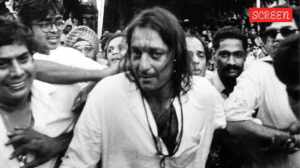Pahari-Gujjar divide in first battle for Jammu ST seats; BJP, INDIA play role reversal
BJP hopes to attract some Gujjar-Bakarwal Muslim votes while leaning on Pahari Hindus, Opp bloc banks on Pahari-Gujjar divide.
 Of the nine ST seats, six are in the Jammu region – including five in the Rajouri-Poonch belt and one in neighbouring Reasi – and three in the Kashmir division. (Express Photo by Manoj CG)
Of the nine ST seats, six are in the Jammu region – including five in the Rajouri-Poonch belt and one in neighbouring Reasi – and three in the Kashmir division. (Express Photo by Manoj CG)After the abrogation of Article 370 giving special status to Jammu and Kashmir (J&K) in August 2019, two significant political developments took place in the Union Territory (UT). One, in a first such move, nine seats out of 90 were reserved for the Scheduled Tribes (STs) following the delimitation of constituencies in 2022. The second move came in February this year, when the BJP-led Centre took another gamble, granting the ST status to four new communities including Paharis, thereby expanding the ST list of J&K, which already included the Gujjar and Bakarwal communities.
Of the nine ST seats, six are in the Jammu region – including five in the Rajouri-Poonch belt and one in neighbouring Reasi – and three in the Kashmir division. Gujjars and Bakarwals have a sizeable population in Rajouri and Poonch districts, even as they are thinly spread across the region. In what was seen as an ambitious social engineering move, the BJP dispensation had earlier hoped to attract these two predominantly Muslim communities, which have a distinct identity as compared to Kashmiri Muslims, to its side by ensuring political representation to them through the reservation of seats for the STs. But the expansion of the ST list, in the run-up to the Lok Sabha elections, has complicated matters ahead of Assembly elections.
The new inclusion in the ST list are the Pahari, Paddari, Gadda Brahmin and Koli communities. Although Pahari includes Muslims and Sikhs, too, Hindus form its largest chunk.
The BJP’s initial enthusiasm vis-a-vis Gujjars was not without reason. It had managed to get some prominent Gujjar leaders to its side. In the 2014 Assembly elections, prominent Gujjar leader Abdul Ghani Kohli won from the Kala Kote Assembly constituency on the BJP ticket and became a minister in the PDP-BJP government. In the Rajouri seat then, the BJP’s Gujjar candidate Chowdhary Talib Hussain had lost by just 2,500 votes. The BJP managed to rope in a few senior Gujjar leaders ahead of the upcoming J&K Assembly elections as well.
This is the first time the Assembly polls will involve the ST seats. With several Gujjar-Bakarwal outfits having openly opposed the expansion of the ST list and vowing to vote against the BJP, which still managed to rope in some prominent Gujjar leaders while eyeing the support of Paharis, the fight for the six ST seats in the Pir Panjal region in the Jammu division is telling.
 The BJP’s initial enthusiasm vis-a-vis Gujjars was not without reason. It had managed to get some prominent Gujjar leaders to its side. (Express Photo by Manoj CG)
The BJP’s initial enthusiasm vis-a-vis Gujjars was not without reason. It had managed to get some prominent Gujjar leaders to its side. (Express Photo by Manoj CG)
These contests also appear to defy the national trend. While the BJP is still hoping to attract some Gujjar-Bakarwal Muslim votes, the Opposition INDIA bloc is banking on a religious divide involving Gujjars-Bakarwals on one side and Paharis on the other. A small section of Paharis is also from the Muslim community, though.
In the 2014 polls, the then J&K state had for the first time in decades voted along communal and regional lines – the Jammu Hindu heartland voted for the BJP and the Kashmir Valley and Jammu’s Muslim majority belts sided with the National Conference (NC) and the PDP.
 The six ST seats at stake in the current polls are Rajouri, Budhal, Thannamandi, Surankote, Mendhar and Gulabgarh.
The six ST seats at stake in the current polls are Rajouri, Budhal, Thannamandi, Surankote, Mendhar and Gulabgarh.
The six ST seats at stake in the current polls are Rajouri, Budhal, Thannamandi, Surankote, Mendhar and Gulabgarh. The BJP could not win any of them last time. Two seats had gone to the PDP and the Congress each and one to the NC. Thannamandi is a newly created seat after delimitation.
Significantly, the first signs of Gujjar-Bakarwal consolidation came in the Lok Sabha elections when the NC’s Mian Altaf Ahmed, a Gujjar face, won the Anantnag-Rajouri Lok Sabha seat.
In the 2014 Assembly polls, the PDP bagged 28 seats as compared to the BJP’s 25, the NC’s 15 and the Congress’s 12 seats. The hung poll verdict led to the PDP-BJP forming a coalition government. The BJP withdrew its support to this government in June 2018 following which J&K has been under the Central rule.
In this election, two INDIA allies NC and Congress are contesting together under a seat-sharing deal. Here is a look at how the contest is shaping in the six ST seats in the Jammu region.
Rajouri
In Rajouri, the BJP candidate is Vibodh Kumar Gupta, a Pahari Hindu. The Congress has fielded state party general secretary Iftkar Ahmed, a Pahari Muslim. The PDP has fielded Tasadiq Hussain, the only Gujjar candidate in the race. There were two other Gujjar candidates in the fray — BJP rebel and ex-MP Chowdhary Talib Hussain, who has now withdrawn his nomination, and a former judge Zubair Ahmed Raza, who has also opted out. The Congress is hoping for a religious polarisation, which, BJP insiders admit, could mar veteran Gupta’s chances.
Surankote
The BJP’s candidate in Surankote in Poonch is Mushtaq Ahmed Shah Bukhari, who has been one of the leading lights of the movement seeking reservation for Paharis. A two-time MLA and ex-NC leader, Bukhari had come second in 2014. He left the NC to join the BJP ahead of the recent Lok Sabha elections. He had apparently fallen out with NC chief Farooq Abdullah over the ST status for Paharis.
His Congress rival in the seat is Mohammed Shahnawaz, a Gujjar. Another Gujjar leader and Congress rebel Ch Mohd Akram, who had won the seat on the Congress ticket in 2014, is contesting as an Independent. The PDP candidate is also a Gujjar. The contest has become Paharis versus Gujjars, with the BJP hoping for a Pahari consolidation and the Congress banking on Gujjars coming together in favour of its candidate.
Thannamandi
In Thannamandi in Rajouri district, it is a face-off between one Gujjar candidate and three Pahari nominees. The PDP candidate in the seat is Qamar Hussain, a Gujjar, who had won from Rajouri in 2014. The other prominent candidates — the Congress’s Mohd Shabir Khan and the BJP’s Mohd Iqbal Malik besides a prominent Independent — are all from the Pahari community. Here again, the Gujjar-Pahari divide is clearly visible. BJP sources admit its candidate is on a weak wicket since there is only one strong Gujjar candidate in fray against three Paharis. Even the Congress camp believes there could be a Gujjar consolidation in favour of the PDP candidate.
Mendhar
In Mendhar, the NC candidate is sitting MLA Javed Ahmed Rana, a Gujjar. His previous PDP opponent Mohd Mahroof Khan, who had come second, has now joined the NC. The BJP’s nominee is Murtaza Ahmed Khan, a Pahari. He was the Congress candidate last time. The PDP candidate is Nadeem Ahmed Khan, also a Pahari. A Gujjar leader Engineer Ishfaq Chowdhary, who is a District Development Council (DDC) member, is in the fray as an Independent candidate.
Budhal
All the three main candidates in Budhal are from the Gujjar community: the BJP’s Chowdhary Zulfikar Ali, a former minister and two-time MLA, the NC’s Javaid Iqbal Choudhary and the PDP’s Guftar Ahmed Choudhary.
Javaid is the nephew of Zulfikar, a renowned Gujjar leader. He had won the seat in 2008 and 2014 on the PDP ticket. He was among a few senior Gujjar leaders who joined the BJP ahead of this election.
Gulabgarh
In the Gulabgarh seat in Reasi, the fight is between the NC’s Engineer Khursheed Ahmed and former minister Aijaz Khan. The BJP’s Mohd Akram Khan and the PDP’s Mohd Farooq are also in contention. All are Gujjar candidates. Aijaz is a three-time MLA and former Congress leader. The Pahari population is not sizeable in Gulabgarh and hence the contest mainly involves these Gujjar candidates.
The J&K elections will be held in three phases – on September 18, September 25 and October 1 – with the counting of votes scheduled for October 8.
- 01
- 02
- 03
- 04
- 05





























